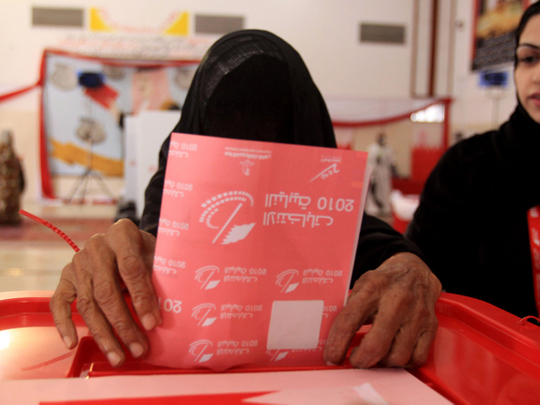
Manama: Bahrain's voters have ushered in a new-look lower chamber that has changed in character from religious conservative to business-friendly, final results indicate.
The two largest Sunni religious societies continued in the second round on October 30, the slide they started in the first phase on October 23. They won a total of five seats, down from the 15 they had in the 2006 – 2010 parliament.
The only liberal society still vying for at least one seat in the second round could not push either of its two candidates across the line. Independent candidates, in the meantime, continued their spectacular ascension.
The new-look chamber has 17 independent lawmakers, making them the second largest bloc, just one member short of the 18-member group representing Al Wefaq, the country's largest political and religious society.
The Islamic Menbar, the offshoot of the Muslim Brotherhood, again performed dismally on Saturday, winning only two constituencies and losing three, including the one where its chairman was running. One week earlier, three of its candidates lost their races.
Al Asala, aligned with the Salafis, managed to win only one seat in the run-off, taking its tally over the two rounds to three, less than half of what it had in the 2006 – 2010 term when it was represented by eight lawmakers.
Speculation is rife about the reasons for their combined loss of popularity, but most observers argued that their lack of co-ordination and direct confrontations were the major reasons for their political haemorrhage.
In 2002 and in 2006, the two societies in Muharraq, Bahrain's second largest city, had a smooth sail into the lower chamber after they worked together to ensure mutual support and seats.
Waad, despite spectacular support by young men and women who turned the streets in the vicinity of their candidates' polling stations with shirts, flags and posters, could not carry a constituency. Their bid was long resisted by conservatives amid claims that the society was not religious enough and could not represent the "religious character of the Bahraini people".
The other liberal societies running in the elections lost since the first round after suffering from similar allegations.
No woman won in either round of the parliamentary elections, leaving Latifa Al Gaood as the only woman in the lower chamber after she won in 2006 and 2010 for lack of competitors in her constituency.
However, Fatima Salman made history by becoming the first woman in the Gulf Cooperation Council to get elected to a municipal council.
Fatima, a well-known activist running independently, won against eight men in Muharraq, the bastion of political societies, to get the much-coveted seat.
King Hamad Bin Eisa Al Khalifa congratulated her in a personal cable, saying that her win heralded another achievement by a Bahraini woman.












